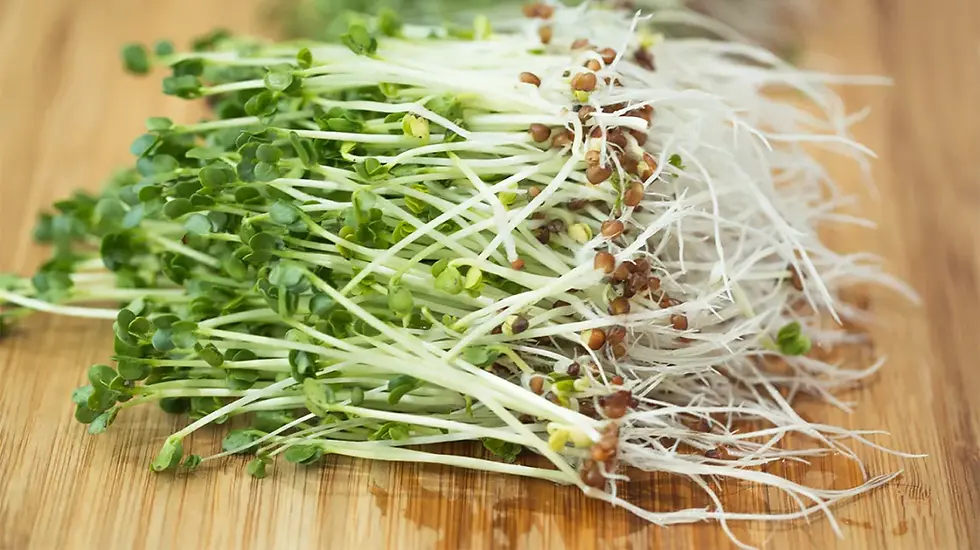20 Foods You Should Be Eating More Of
- Jonny Slick

- May 10, 2023
- 3 min read
I’m sure you’ve seen list after list of what foods to avoid if you’re trying to eat healthy or lose weight. They say, “Don’t eat this and don’t eat that,” and honestly, 99% of those lists are absolute nonsense. In my 15+ years of coaching, I’ve found that telling people to NOT do something is definitely not the best way to get them to make better choices. I prefer to teach my clients how to incorporate a variety of nutrient-dense foods into their diets so they can improve their overall health, get adequate amounts of micronutrients, and fill up on the “good stuff” so they are less likely to snack on higher calorie foods that aren’t helpful for achieving their health goals. So here are 20 foods that you should be eating more of to meet your daily nutrient needs and stay on track with your healthy eating!

Berries: Berries are high in antioxidants, fiber, and vitamin C. Some of the best options include blueberries, raspberries, strawberries, and blackberries.

Leafy greens: Dark, leafy greens such as spinach, kale, and Swiss chard are packed with vitamins A, C, and K, as well as folate and iron.

Salmon: This fatty fish is high in omega-3 fatty acids, which have been linked to numerous health benefits, including reduced inflammation and improved brain function.

Nuts and seeds: Almonds, walnuts, chia seeds, and flaxseeds are all excellent sources of healthy fats, fiber, and protein.

Cruciferous vegetables: Vegetables such as broccoli, cauliflower, and Brussels sprouts contain sulforaphane, a compound that has been shown to have anticancer properties.

Legumes: Lentils, chickpeas, and black beans are all high in protein, fiber, and numerous vitamins and minerals.

Sweet potatoes: This root vegetable is an excellent source of beta-carotene, which is converted to vitamin A in the body.

Avocado: Avocado is rich in heart-healthy monounsaturated fats, fiber, and potassium.

Quinoa: This gluten-free grain is high in protein, fiber, and numerous vitamins and minerals, including magnesium, iron, and zinc.

Tomatoes: Tomatoes are high in vitamin C, potassium, and lycopene, an antioxidant that has been linked to a reduced risk of certain types of cancer.

Eggs: Eggs are a great source of protein, as well as vitamins D and B12.

Greek yogurt: Greek yogurt is high in protein and calcium, and it also contains probiotics, which are beneficial for gut health.

Dark chocolate: Dark chocolate is high in antioxidants and has been linked to improved heart health and brain function.

Broccoli sprouts: These sprouts are a concentrated source of sulforaphane, the same compound found in broccoli.

Turmeric: Turmeric contains curcumin, a compound with potent anti-inflammatory properties.

Garlic: Garlic is high in sulfur compounds that have been shown to have numerous health benefits, including reducing blood pressure and cholesterol levels.

Spinach: Spinach is rich in iron, folate, and vitamins A and C.

Apples: Apples are high in fiber, vitamin C, and antioxidants.

Oats: Oats are high in fiber and protein, and they also contain numerous vitamins and minerals, including iron and zinc.

Green tea: Green tea is high in antioxidants, and it has been linked to numerous health benefits, including improved brain function and a reduced risk of certain types of cancer.
Incorporating these foods into your diet can help you meet your daily nutrient needs and promote optimal health. Remember to focus on variety and moderation, and aim for a balanced diet that includes a variety of whole, nutrient-dense foods. And finally, let’s start focusing more on what we should be eating MORE of instead of trying to follow the ridiculous lists of foods to avoid.



Comments